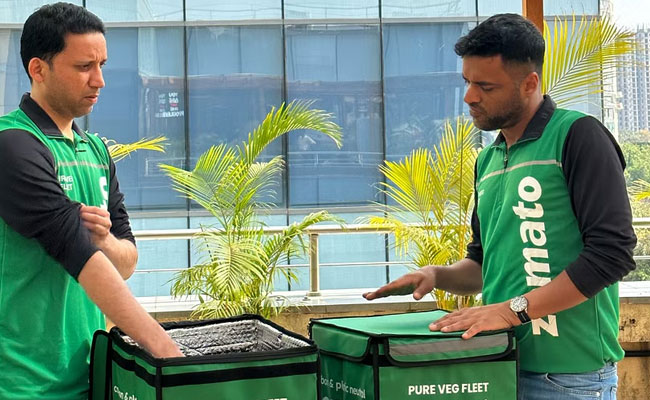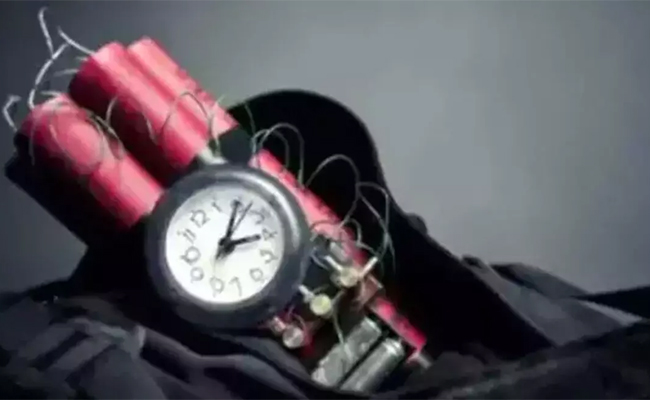New Delhi (PTI): Amid a backlash over its policy to introduce a new "Pure Veg Mode" service, Zomato CEO Deepinder Goyal on Wednesday said the company will roll back the move to introduce green uniform for its new fleet, clarifying that all its riders will continue to wear red.
The Zomato CEO was in the eye of a storm after the launch of a "Pure Veg Mode" service, intended for strictly vegetarian customers in India, to be delivered by a "Pure Veg Fleet". Netizens expressed concern over the move, saying that some societies and RWAs may not allow Zomato's regular fleet to enter on the basis of the red-green colour segregation.
"While we are going to continue to have a fleet for vegetarians, we have decided to remove the on-ground segregation of this fleet on the ground using the colour green. All our riders -- both our regular fleet, and our fleet for vegetarians, will wear the colour red," Goyal said in an update post on X, formerly Twitter.
He explained that the fleet meant for vegetarian orders would not be identifiable on the ground but would show on the Zomato app and reassured customers that their veg orders would be served by the Veg Only fleet.
Elaborating on the rationale behind the decision, Goyal said this will ensure that Zomato's red uniform delivery partners are not incorrectly associated with non-veg food, and blocked by any RWAs or societies during any special days.
Further, He emphasised, "our riders' physical safety is of paramount importance to us", adding, "We now realise that even some of our customers could get into trouble with their landlords, and that would not be a nice thing if that happened because of us".
Goyal concluded the long post on X by thanking netizens for their input as he said, "You made us understand the unintended consequences of this rollout. All the love, and all the brickbats were all so useful - and helped us get to this optimal point".
In a long late-night post on X on Tuesday, the Zomato CEO had said the food delivery platform will "roll it back in a heartbeat" in case it witnesses significant negative social repercussions arising from the move.
Goyal had also sought to allay concerns expressed by some users that some societies and RWAs may not allow Zomato's regular fleet to enter, after the launch of the "Pure Veg Fleet" in India for its pure vegetarian customers.
"There's an opinion that some societies and RWAs will now not let our regular fleet in. We will stay alert for any such cases and work with these RWAs to not let this happen. We understand our social responsibility due to this change, and we will not back down from solving it when the need arises," Goyal had said.
He elaborated upon the reason behind the introduction of the company's "Pure Veg Mode" service.
"But why did we need to separate the fleets? Because despite everyone's best efforts, sometimes the food spills into the delivery boxes. In those cases, the smell of the previous order travels to the next order and may lead to the next order smelling of the previous order. For this reason, we had to separate the fleet for veg orders," the Zomato CEO said.
He further emphasised that the new service strictly serves a dietary preference irrespective of a person's religion or caste.
"I would like to repeat that this feature strictly serves a dietary preference. And I know there are a lot of customers who would never order food from a restaurant which serves meat, irrespective of their religion/caste," Goyal said.
He also informed that participation in the company's Veg delivery fleet will not discriminate on the basis of its delivery partner's dietary preferences.
He concluded the post by promising that Zomato will roll back the Pure Veg Mode service in the event of significant negative social repercussions.
"And I promise, that if we see any significant negative social repercussions of this change, we will roll it back in a heartbeat," Goyal said.
He announced the launch of a "Pure Veg Mode" service on Tuesday to cater to customers who have pure vegetarian dietary preferences.
Goyal cited feedback from vegetarian customers as the reason for the launch of the new service and informed that the online food delivery platform is also introducing a "Pure Veg Fleet" in India for customers who follow a 100 per cent vegetarian diet.
In a series of posts on X, formerly Twitter, Goyal stated that India has the highest percentage of vegetarians globally, and these new features were launched based on their feedback.
Update on our pure veg fleet —
— Deepinder Goyal (@deepigoyal) March 20, 2024
While we are going to continue to have a fleet for vegetarians, we have decided to remove the on-ground segregation of this fleet on the ground using the colour green. All our riders — both our regular fleet, and our fleet for vegetarians, will…
Let the Truth be known. If you read VB and like VB, please be a VB Supporter and Help us deliver the Truth to one and all.
Girona (Spain) (AP): Lamine Yamal missed a penalty as Barcelona lost at Girona 2-1 on Monday and passed up a chance to overtake Real Madrid at the top of La Liga.
The defeat was the second in less than a week for Barca and left it second in the table, two points behind Madrid.
A win would have taken it above its archrival but, instead, a crisis brewed for coach Hansi Flick, whose side lost to Atletico Madrid 4-0 in the Copa del Rey last week.
The second loss came even though Barcelona took the lead early in the second half.
Yamal hit the post with his spot kick on the stroke of halftime but 14 minutes into the second period Pau Cubarsí met Jules Kounde's cross from the right and placed his header perfectly into the top corner.
The goal was Barcelona's 100th in all competitions this season and made it the second club in Europe's big five domestic leagues to hit the century after Bayern Munich.
However, Girona roared back into the game just three minutes later.
Barcelona's Joan Garcia was already the busier of the two goalkeepers but he could not stop Thomas Lemar side-footing home from close range after nice work from Vladyslav Vanat on the left wing.
Both sides pushed for a decisive second and it was Girona who executed with three minutes remaining, substitute Fran Beltrán scoring with a low shot from just inside the box.
Girona's Joel Roca was sent off in the dying seconds but there were no more goals.
The victory ended a three-game winless streak for Girona and lifted it three places into 12th, equal on points with Getafe.
Only seven points separate the 11 clubs from eighth to 18th in La Liga.





